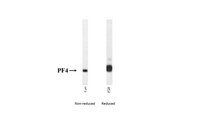MABS1255 Sigma-AldrichAnti-Platelet Factor 4 Antibody, clone 197.2
Detect PF4 using this mouse monoclonal Anti-Platelet Factor 4, clone 197.2, Cat. No. MABS1255, validated for use in ELISA, Flow Cytometry, Function Analysis, Immunocytochemistry. and Western Blotting.
More>> Detect PF4 using this mouse monoclonal Anti-Platelet Factor 4, clone 197.2, Cat. No. MABS1255, validated for use in ELISA, Flow Cytometry, Function Analysis, Immunocytochemistry. and Western Blotting. Less<<Recommended Products
Overview
| Replacement Information |
|---|
Key Spec Table
| Species Reactivity | Key Applications | Host | Format | Antibody Type |
|---|---|---|---|---|
| H | ELISA, FC, ICC, WB | M | Purified | Monoclonal Antibody |
| References |
|---|
| Product Information | |
|---|---|
| Format | Purified |
| Presentation | Purified mouse IgG1 in buffer containing PBS without preservatives. |
| Quality Level | MQ100 |
| Physicochemical Information |
|---|
| Dimensions |
|---|
| Materials Information |
|---|
| Toxicological Information |
|---|
| Safety Information according to GHS |
|---|
| Safety Information |
|---|
| Packaging Information | |
|---|---|
| Material Size | 100 μg |
| Transport Information |
|---|
| Supplemental Information |
|---|
| Specifications |
|---|
| Global Trade Item Number | |
|---|---|
| Catalogue Number | GTIN |
| MABS1255 | 04054839056321 |
Documentation
Anti-Platelet Factor 4 Antibody, clone 197.2 MSDS
| Title |
|---|
Anti-Platelet Factor 4 Antibody, clone 197.2 Certificates of Analysis
| Title | Lot Number |
|---|---|
| Anti-Platelet Factor 4, clone 197.2 - 4053070 | 4053070 |
| Anti-Platelet Factor 4, clone 197.2 - 4078152 | 4078152 |








